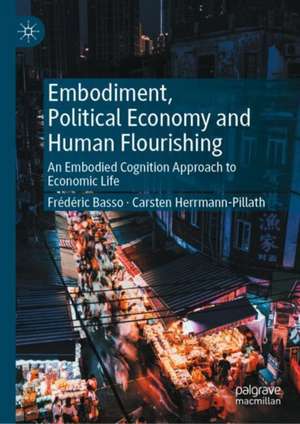Embodiment, Political Economy and Human Flourishing: An Embodied Cognition Approach to Economic Life
Autor Frédéric Basso, Carsten Herrmann-Pillathen Limba Engleză Hardback – 12 mai 2024
Preț: 662.53 lei
Preț vechi: 728.06 lei
-9% Nou
Puncte Express: 994
Preț estimativ în valută:
126.77€ • 132.10$ • 104.97£
126.77€ • 132.10$ • 104.97£
Carte tipărită la comandă
Livrare economică 31 martie-07 aprilie
Preluare comenzi: 021 569.72.76
Specificații
ISBN-13: 9783031549700
ISBN-10: 3031549708
Ilustrații: XXI, 592 p. 26 illus., 1 illus. in color.
Dimensiuni: 148 x 210 mm
Greutate: 0.88 kg
Ediția:2024
Editura: Springer International Publishing
Colecția Palgrave Macmillan
Locul publicării:Cham, Switzerland
ISBN-10: 3031549708
Ilustrații: XXI, 592 p. 26 illus., 1 illus. in color.
Dimensiuni: 148 x 210 mm
Greutate: 0.88 kg
Ediția:2024
Editura: Springer International Publishing
Colecția Palgrave Macmillan
Locul publicării:Cham, Switzerland
Cuprins
Introduction.- Chapter 1.The ills of disembodiment and abstraction in economics.- Chapter 2. The Hayek paradox of abstraction and embodiment.- Chapter 3. Principles of embodiment.- Chapter 4. Embodied agency in the economy.- Chapter 5. The embodied approach to institutions.- Chapter 6. Abstraction and embodiment in the core institutions of capitalism: Money, property, labor.- Chapter 7. Embodied market utopia: Human flourishing in economic life.
Notă biografică
Frédéric Basso is Associate Professor of Economic Psychology in the Department of Psychological and Behavioural Science at the London School of Economics and Political Science, UK. His academic work aims to apply, develop, and extend the literature on embodiment to understand and change economic life.
Carsten Herrmann-Pillath is Professor and Permanent Fellow at the Max Weber Centre for Advanced Cultural and Social Studies, University of Erfurt, Germany. His transdisciplinary research covers economic philosophy, evolutionary, ecological and institutional economics, semiotics, and Chinese studies. His recent books include the volume edited with Jens Harbecke ‘Social Neureconomics. Mechanistic Integration of the Neurosciences and the Social Sciences’ (2020). A summa of his work was published in 2023 (co-authored with Christian Hederer): ‘A New Principles of Economics. The Science of Markets’.
Carsten Herrmann-Pillath is Professor and Permanent Fellow at the Max Weber Centre for Advanced Cultural and Social Studies, University of Erfurt, Germany. His transdisciplinary research covers economic philosophy, evolutionary, ecological and institutional economics, semiotics, and Chinese studies. His recent books include the volume edited with Jens Harbecke ‘Social Neureconomics. Mechanistic Integration of the Neurosciences and the Social Sciences’ (2020). A summa of his work was published in 2023 (co-authored with Christian Hederer): ‘A New Principles of Economics. The Science of Markets’.
Textul de pe ultima copertă
This book presents embodied economics as a foundational alternative to behavioral economics and other projects integrating economics and psychology inspired by the computational paradigm. The 20th century witnessed the disembodiment of economic models through the intensification of mathematization and formal abstraction in economics. Even proponents of an embodied approach to cognition, such as Hayek, paradoxically championed the abstract market order as a disembodied superhuman intelligence. In the wake of groundbreaking perspectives in cognitive and social sciences, which have helped to rethink the fundamental building blocks of economics, agency and institutions, this title takes a radical turn towards embodiment. Reinstating economics as political economy, embodied economics motivates a critique of capitalism based on the analysis of disembodiment through abstraction and reactivates key critical insights into the anthropology put forward by the young Marx about contemporary economics and its conceptualizations of money, property, and labor. Based on this analysis, the authors envision a concrete utopia for an economic order centered on human dignity and care for life on Earth. This book contributes to recent discussions about behavioral, experimental and neuroeconomics and addresses a transdisciplinary audience in the social and behavioral sciences, philosophy, and the humanities.
Frédéric Basso is Associate Professor of Economic Psychology in the Department of Psychological and Behavioural Science at the London School of Economics and Political Science, UK. His academic work aims to apply, develop, and extend the literature on embodiment to understand and change economic life.
Carsten Herrmann-Pillath is Professor and Permanent Fellow at the Max Weber Centre for Advanced Cultural and Social Studies, University of Erfurt, Germany. His transdisciplinary research covers economic philosophy, evolutionary, ecological and institutional economics, semiotics, and Chinese studies. His recent books include the volume edited with Jens Harbecke ‘Social Neureconomics. Mechanistic Integration of the Neurosciences and the Social Sciences’ (2020). A summa of his work was published in 2023 (co-authored with Christian Hederer): ‘A New Principles of Economics. The Science of Markets’.
Frédéric Basso is Associate Professor of Economic Psychology in the Department of Psychological and Behavioural Science at the London School of Economics and Political Science, UK. His academic work aims to apply, develop, and extend the literature on embodiment to understand and change economic life.
Carsten Herrmann-Pillath is Professor and Permanent Fellow at the Max Weber Centre for Advanced Cultural and Social Studies, University of Erfurt, Germany. His transdisciplinary research covers economic philosophy, evolutionary, ecological and institutional economics, semiotics, and Chinese studies. His recent books include the volume edited with Jens Harbecke ‘Social Neureconomics. Mechanistic Integration of the Neurosciences and the Social Sciences’ (2020). A summa of his work was published in 2023 (co-authored with Christian Hederer): ‘A New Principles of Economics. The Science of Markets’.
Caracteristici
Presents a new paradigm of "embodied economics" to make sense of contemporary markets Offers fresh perspectives on institutional design of markets beyond and against the standards of efficiency Radically reinterprets the naturalistic turns in economics, with the rise of new fields such as neuroeconomics
